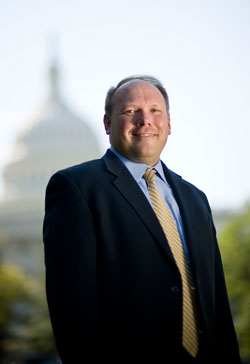Working the Process

The saying in the corridors of power is: "If you're here for two years, you'll probably be here for four. If you're here for four years, you'll probably be here for ten. If you're here for ten years, settle down." Paul Palagyi '91 has settled down, and relishes his career in politics and public service. "It can be addictive," he says.
Palagyi arrived in Washington in 1997, when he was hired by Senator Mike DeWine, R-Ohio, as a legislative assistant in charge of conservation policy, an area that Palagyi particularly enjoys. The Madison, Ohio, native had started his career assigned to education policy on the staff of the Republican majority in the Ohio House of Representatives. He later joined the administration of George Voinovich, then Ohio governor, and worked as an executive assistant on education policy before shifting to the Ohio Department of Natural Resources to run "the legislative affairs shop."
How did you get started with Senator DeWine?
Senator DeWine asked if I wanted to come to Washington. I was kind of a fan of learning about the political process and the policy process.
He has a real passion for the environment, and he asked me to help him work on conservation issues. We were fortunate in that he was on the Appropriations Committee, and we were able to get money for parks and for local conservation. He went to the Health, Education, Labor, and Pensions Committee, and I was assigned to that committee to handle education policy in addition to energy, environment, and conservation issues. That was my focus for a couple of years. It was hard work. It was fun. Then I was promoted to the personal office to be the legislative director for DeWine.
DeWine was defeated in 2006. How did you land with Corker?
He was a guy who won that year. I had some other offers off the Hill. But I met him and I was really impressed. He's here for the right reasons. Bob Corker is one of the smartest people I've ever dealt with. He wanted somebody who knew how to move things, somebody who had been through that process. How does the Senate work? It's a very procedure-driven place. And it's very chaotic sometimes. I make sure my boss understands the procedure. We had to build a whole new staff and take them on the learning curve.
With the staff up and running, what role do you play?
We have people on the staff with expertise on any issue you can think of. The legislative director supervises those people. You get great policy discussions. The primary job, for the citizens of the state and for our boss, is to provide the information needed to make decisions. You explain what the question is. Here are both sides of the argument. Whatever needs to be talked about, you're talking about it with this decision-maker. You may feel strongly one way. But you have to remember that your job here is not to be making decisions. You set your bias aside. They're the ones with their names on the ballot.
Must you have similar views as your boss?
It's not a must. No two people are going to agree on everything. The job will give me an opportunity to express my opinions, but, on the legislative staff, that always has to be secondary. We provide the facts.
What's it like to be in Washington right now?
It's a fun time, with lots of change, lots of things on the table. And it's a very sobering time when you're talking about those issues. Health care, Afghanistan, Iraq, climate change. It's a very humbling time. I'm sitting behind a desk; I'm not in Afghanistan. This public service is way below that.
How would you describe the partisan atmosphere?
It's been good and bad here. I have really enjoyed working with people on both sides of the aisle. Washington is a crossroads of ideas. I really enjoy it when the battle is about ideas. Unfortunately, some people make it personal.
Why public service?
That's something I was always brought up on by my parents. You give something back. I never thought it would be a career.

 Delicious
Delicious Facebook
Facebook StumbleUpon
StumbleUpon Digg
Digg reddit
reddit